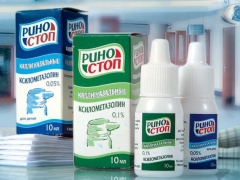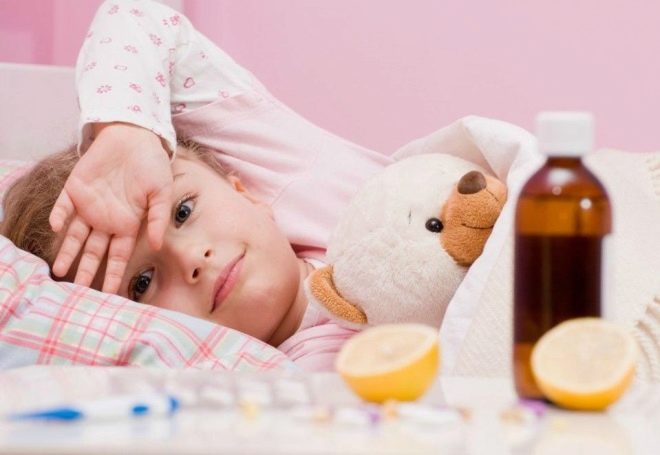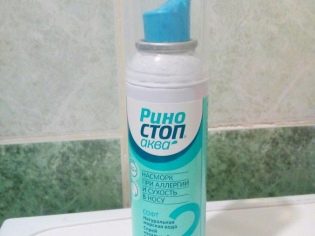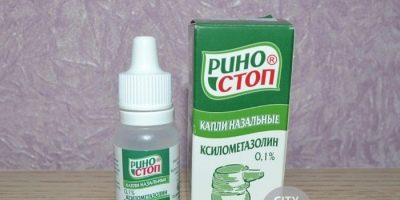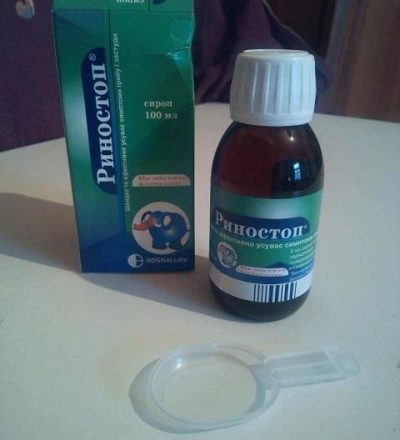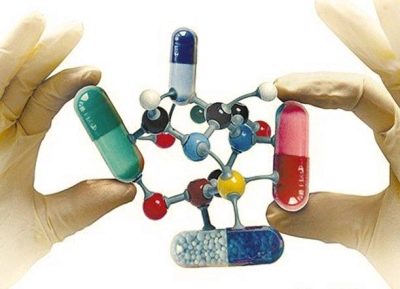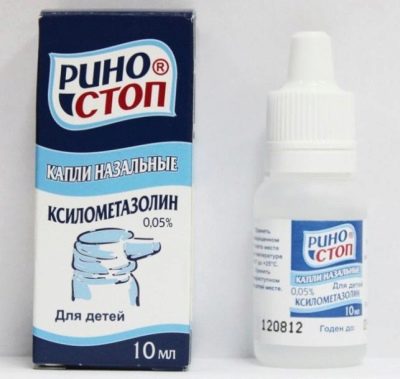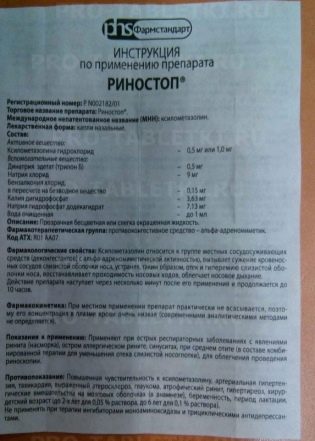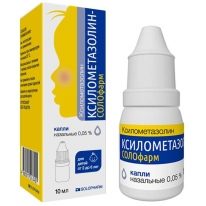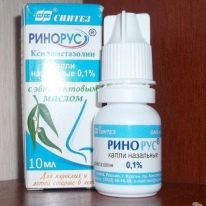Rinostop for children: instructions for use
Unfortunately, children's colds are quite common, especially during the cold season. Hypothermia reduces immunity, an infection penetrates the body, and the child becomes ill. There are many different remedies for treating babies. Rinostop stands out among them in that it comes in various forms and is suitable for treating all manifestations of colds and flu.
Release form
Under the name "Rinostop" nasal drops, spray, gel, as well as tablets and syrup are produced. Nasal means are presented in special children's dosages. The gel is used for children who are 7 years old.
For children up to the age of six, it is necessary to use nasal preparations with an active ingredient concentration of 0.05%. In a milliliter of the Rinostop nasal solution with this concentration contains 5 mg of xylometazoline.
Drops "Rinostop" depending on the manufacturer are available in glass and plastic bottles with a pipette. Spray produced in containers with a spray. For the convenience of customers, children's funds (with a lower concentration of the active component) are decorated with a blue label. Products for adults have a green label.
Syrup is sold in bottles of 100 ml. A volume of 5 ml is approximately one teaspoonful of syrup. It contains 101 mg of paracetamol, 20.2 mg of pseudoephedrine and 1.01 mg of chlorphenamine maleate. Rinostop tablets are produced in plastic packages of 10 pieces.
In addition, there is a series of "Rinostop Aqua", including sprays for washing and irrigation of the nose on the basis of purified sea water. In the assortment there is a special children's spray that can be used for newborns, a spray for daily use and for the prevention of colds and allergies in children, a spray against the common cold for acute colds and a remedy for the treatment of chronic rhinitis.
Sprays are available in aluminum cylinders under pressure with an internal antiseptic coating and spray nozzles in a volume of 50 and 125 ml.
Composition
The main active component of nasal remedies “Rinostop” is xylometazoline hydrochloride. This alpha adrenostimulyator is widely used in the manufacture of medicines, including those indicated for the treatment of rhinitis of various etiologies.
The composition of the drops "Rinost" in addition to the main substance includes auxiliary components. For example, Trilon B is used not only in the pharmaceutical industry, but also in the perfumery industry, since it can form stable water-soluble compounds. The World Health Organization has introduced Trilon B to the list of components approved for pharmaceutical production.
Also in the drops there are other preservatives and stabilizers, for example, regular table salt. An aqueous solution is prepared on the basis of prepared, that is, purified from any impurities of water. Rhinostop nasal spray of 0.05% has almost the same composition.
The action of the tablets and syrup "rhinostop" is based on such a well-known drug as paracetamol. The second important substance in the composition of the drug is pseudoephedrine, which is released from the shoots of the shrub ephedra horsetail. Chlorphenamine maleate 1 is a sedative that is often included in anti-cough drugs to relieve swelling of the nose, throat, and larynx.
Auxiliary substances in syrup and tablets are lactose and corn starch. Also in this tool for kids add raspberry flavor and red natural dye. Sometimes a baby can be difficult to drink medicine, and a pleasant berry smell and color help parents and make the treatment more pleasant for the child.
Means from the “Rinostop Aqua” series contain purified sea water, which retains all the macro and microelements. The salt content varies in irrigation products depending on whether they are intended for children or adults, as well as on the purpose of use (nasal washing, prevention or treatment of the common cold, treatment of chronic diseases).
Operating principle
Since the main active ingredient in nasal drops, sprays and gel is the alpha-adrenostimulyator, then when the drug is in contact with the nasal mucosa, blood vessels narrow. It helps to remove puffiness and redness. The drug begins to act in just 5-10 minutes. It becomes easier for the child to breathe, often nasal breathing is fully restored. This is especially important for children of the first year of life who still do not know how to breathe through their mouths.
The action of the tablets and syrup is due to three main components. Paracetomol reduces fever, has anti-inflammatory effect. Pseudoephedrine narrows blood vessels. Chlorphenamine has a slight sedative effect, reduces the intensity of sneezing, reduces itching.
In combination, these drugs effectively alleviate the condition of the child, allow them to feel better during the day, and at night - to fully sleep, which brings recovery.
Indications
The main symptom for the use of nasal drops and sprays "Rinostop" (and for children over 7 years old - gel with the same name), is a condition that in everyday life is called a runny nose. Doctors distinguish acute rhinitis, sinusitis, pollinosis, allergic rhinitis. The type of disease is determined depending on the site of edema and the cause. "Rinostop" can be used for any cold. In addition, "Rinostop" is effective in the treatment of otitis media while taking other medications.
Nasal means "Rinostop" (including a series of "Rinostop Aqua" with sea water), doctors recommend using and to prepare for various procedures and surgical operations in the nasal passage.
Tablets and syrup are recommended for treating the common cold, which is manifested by such symptoms as an increase in the child's body temperature, fever, chills, headache. Such conditions are often accompanied by a cold. Also, “Rinostop” in the form of tablets and syrup is effective in the symptomatic treatment of influenza and allergic rhinitis.
From what age is prescribed?
In the instructions for use of nasal remedies "Rinostop" manufacturers warn that the drug can only be used to treat children over 2 years of age. On the recommendation of the doctor, you can give a dose of medicine and babies as old as one and a half. But it's better not to make such decisions on your own.
Rinostop syrup is also used only after 2 years. Tablets and nasal gel suitable for children over 6 years.
Contraindications
Rinostop drugs are not prescribed if the child has previously been found to be sensitive to one or more of the main or auxiliary components. For example, lactose intolerance is quite common.
You can not use the nasal means "Rinostop", if the child takes anti-depressants MAO or tricyclic antidepressants, with atrophic rhinitis. Both nasal and cough remedies are not recommended for high blood pressure, tachycardia, which are found in children. Also, the drug will not work if the child had a surgery on the brain.
Children with diabetes mellitus should be prescribed Rinostop drugs only under the supervision of a physician.
Side effects
If a child has an individual sensitivity to the components of “Rhinostop”, then a runny nose may even get worse during nasal treatment. There may be redness of the nasal mucosa, feeling of dryness. The child will often sneeze. Also, the baby may begin to hurt the head, appear vomiting. Sometimes a child cannot fall asleep.
When taking pills, skin rash, itching, nausea, vomiting and diarrhea, dry nose and mouth, irritability, or, conversely, drowsiness sometimes occur. In very rare cases, angioedema is possible.
Dosage
The instructions for use say that with intranasal administration in children from 2 to 6 years old, it is recommended to administer one or two drops of “Rinostop” 0.05% no more than three times a day. Children over 6 years old show “Rinostop” 0.1% two to three drops or one injection up to 4 times a day.
Nasal gel is used only for children over 7 years old and 3-4 times a day (the last time - before bedtime).
In the treatment of nasal agents, the duration of use should not exceed 5 days.
Tablets for the treatment of children over 12 years old are prescribed 1 unit every 12 hours, from 6 to 12 years old - half a tablet in the same interval. Duration of treatment should be no more than 5 days. A more accurate course is prescribed by the attending physician.
As for syrup, children under 6 years old need to take it one teaspoon every 12 hours, children aged 6–12 years old - two teaspoons each. Treatment also lasts 3 to 5 days.
Means "Rinostop Aqua Norm" is used 4-6 times a day, including for cleaning the nose before the administration of the medicine.
Overdose
If you do not follow the dose of “Rinostop” drugs and do not take into account the maximum duration of treatment indicated in the instructions, an overdose may occur. It manifests itself more pronounced manifestation of side effects of the drug. It may appear itchy, dry nose. In rare cases, swelling of the mucous membrane develops, pressure increases, and a headache begins.
Interaction with other drugs
Rhinostop nasal treatment is not combined with the use of MAO inhibitors and tricyclic antidepressants. In addition, they enhance the effect of sedatives.
Anti-cough drugs "Rinostop" with joint treatment with MAO inhibitors can cause hypertensive crisis - a sharp increase in pressure to critical levels.
Terms of sale and storage
Rinostop is sold without a prescription.
Manufacturers recommend storing medications at ambient temperatures from 0 to 25? C. Medicines in liquid form must be protected from direct sunlight. Also, they should not be available for uncontrolled use by children.
Shelf life: spray - 2 years, a drop - 3 years, anti-cold preparations - 5 years. After the expiration date, you can not use the "Rostop".
Reviews
Doctors speak of Rinostop products as medicines that quickly and effectively eliminate nasal congestion in children with various types of rhinitis. Syrup and tablets reduce the temperature, improve the well-being of babies. Drugs work well in cases where rhinitis is caused by allergies.
Parents note that various formats, both nasal and cough remedies, make it possible to choose the best option for a child of any age. Kids with pleasure drink sweet syrup. Many children like not to bury the medicine in the nose, but to “splash” it with spray.
In addition, when using the Rinostop Aqua series, a child from childhood gets used to regular hygienic procedures.
Worth Rinostop inexpensive. The price of nasal drops for children is on average only 35 rubles, the spray costs about 100 rubles.
Analogs
Analogues of "RinoStop" on the main component are nasal means "Renorus», «Xylometazoline», «Xylen". All these drugs are sold at a low price. Syrups of the Doctor Theiss, Talenol, and others series act as analogues of cough rhinos.
For information on how to treat a child’s runny nose, see the next video.
